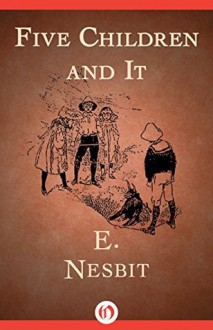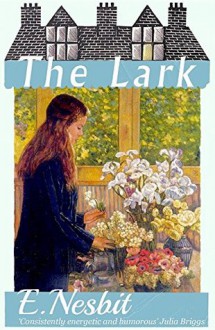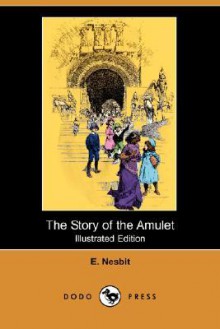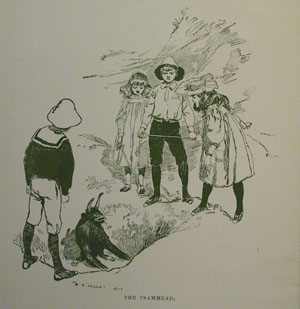
It would have been of little interest to me as a child, but this was published in 1902, which means it predates the superficially similar "The Lion, the Witch and the Wardrobe" (parentless children having supernatural adventures in a country-house setting) by several decades. That association is the most likely to have occurred to me (had I been a literary critic of a child), along with the very recognizable pattern of Aladdin's lamp wishes, always having unexpected outcomes.
Though the story is told in quite a jocular tone, the wishes at times look like taking a really serious turn for the awful, though of course nothing horrible ever actually happens to this charmingly naive and well-characterized family of two girls and two boys (plus baby), each with his or her own strengths and fears. (Of course, there is tremendous gender stereotyping, but it's a 1902 book, after all). I vaguely remember being quite fond of this story as a child, but preferring its sequel, "The Phoenix and the Carpet", which I probably should make a point of re-reading (to discover why I preferred it). Re-reading Five Children and It half a century later, most of it was still full of harmless chuckles, the most difficult parts being the two episodes featuring gypsies and Red Indians respectively, since one is painfully aware of the harmful stereotypes being perpetrated through these fictional tropes. The blow is softened a little by the fact that the children routinely get the details of the stereotypes muddled up in daft ways (as indeed they do with the other major "romance setting" adventure, being in a besieged castle). Nesbit has great fun with this last, pointing out that the besieging army's accoutrements are drawn from at least seven or eight different centuries of history, as per the imagination of the illustrators' of historical and children's novels. (This is the kind of humorous passage that would have flown right over my head as a child, but would have amused an adult reading to a child). One gets the sense that she is also poking fun at the incompleteness and inaccuracy of the children's perceptions of gypsies and Red Indians, drawn as they would be merely from children's literature; in other words, we are not to take these manifestations seriously at all, any more than we take the Psammead's peculiar version of Stone Age archaeology seriously. Still, these days we cannot but be sensitive to racialized tropes.
I don't know how accurate Nesbit's depiction of children's behaviour in 1902 could be deemed to be (they seem pretty recognizable to me, though shockingly well-spoken), but she certainly has a feel for childhood logic and for the way children bravely supply the gaps in their information with anything they have overheard (however imperfectly) from the adult world. I wish I had had an illustrated edition of this to read, instead of the mere text in my Kindle. It would have taken me even further back into a happy place and time where wishes were possible, even though they might have a tendency to go badly wrong and need to be reversed at sunset.

 Log in with Facebook
Log in with Facebook 








